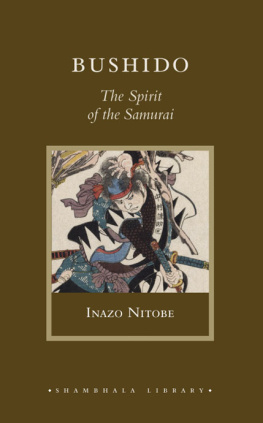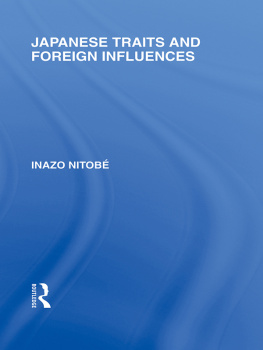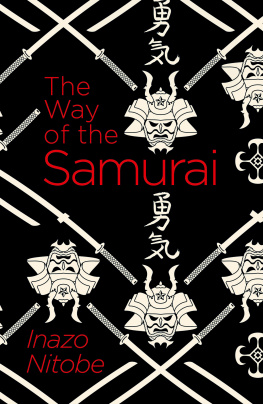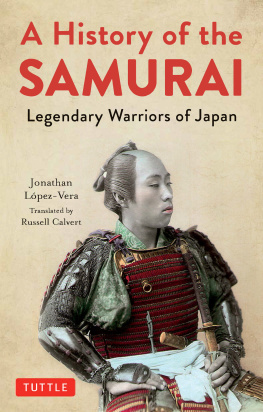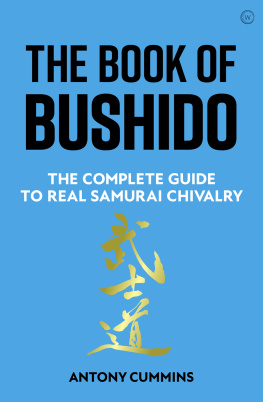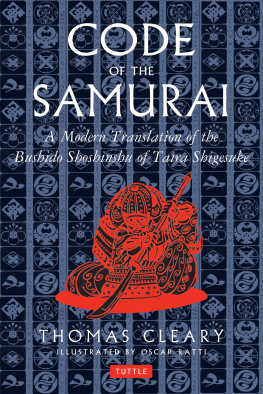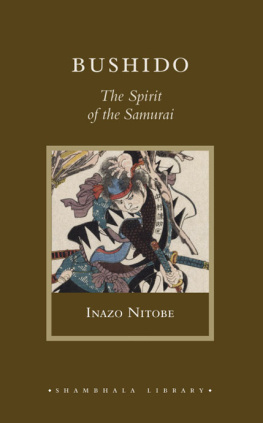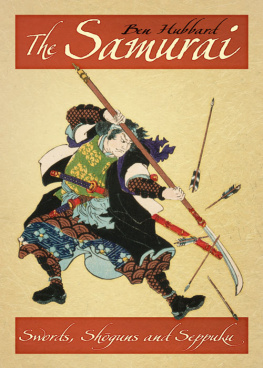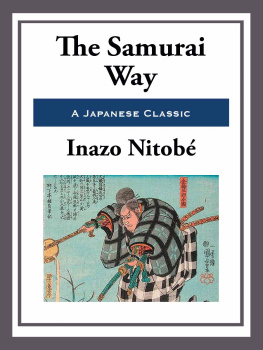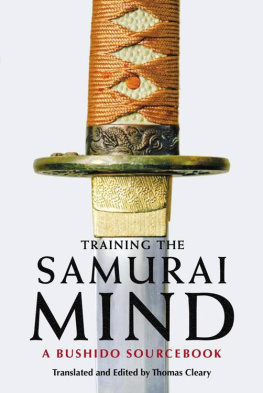Absolutely the best explanation of bushido in the English language.
Nicklaus Suino, author of The Art of Japanese Swordsmanship
ABOUT THE BOOK
There are eight virtues of Bushido, the code of the samurai: justice, courage, benevolence, politeness, sincerity, honor, loyalty, and self-control. These virtues comprise the essence of Japanese cultural beliefs, which are still present today.
Inazo Nitobe, one of Japans most respected scholars, explores the ethical code of the samurai and contextualizes it within Japans traditions of Buddhism, Shintoism, and Confucianism. He then compares and contrasts Eastern values with those present in Western societies. Written in English and first published in 1905, this classic introduction to Japans samurai culture has been a best-seller for decades. Focus on Asian Studies says it is a must for an understanding of the soul of Japan.
INAZO NITOBE (18621933) was born in Japan and began studying English when he was nine years old. He attended colleges in Japan, the United States, and in Germanywhere he earned five doctorate degrees. Nitobe was an educator, a cultural ambassador, and one of the best-known Japanese writers of his time.
Sign up to receive our Martial Arts newsletter, which includes information about new books, special offers, discounts, and more.

Or visit us online to sign up at shambhala.com/emartialarts.
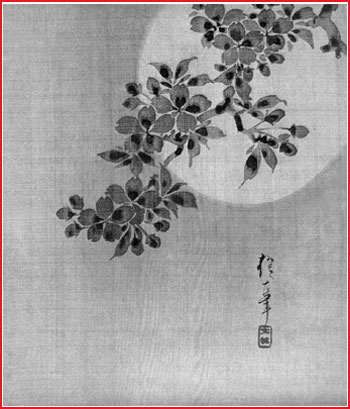
BUSHIDO

The Spiritof the Samurai
INAZO NITOBE

SHAMBHALA
Boston & London
2014
FRONTISPIECE: Moon on Cherry Blossoms, painting by Hoitsu Sakai, courtesy of the Langen Foundation.
SHAMBHALA PUBLICATIONS, INC.
Horticultural Hall
300 Massachusetts Avenue
Boston, Massachusetts 02115
www.shambhala.com
All rights reserved. No part of this book may be reproduced in any form or by any means, electronic or mechanical, including photocopying, recording, or by any information storage and retrieval system, without permission in writing from the publisher.
Cover art: Stories of the True Loyalty of the Faithful Samurai (detail), by Utagawa Kuniyoshi. 2005 Museum of Fine Arts, Boston
The Library of Congress Cataloging-in-Publication Data
Nitobe, Inazao, 18621933.
Bushido: the spirit of the samurai/Inazao Nitobe. 1st Shambhala library ed.
p. cm.
Originally published: 10th rev. and enl. ed.
New York: Putnam, 1905.
eISBN 978-0-8348-2355-6
ISBN 1-59030-290-7 (hardcover: alk. paper)
1. Bushido. I. Title.
BJ971.B8N58 2005
170.440952dc22
2005010873
To my beloved uncle
TOKITOSHI OTA
who taught me to revere the past and
to admire the deeds of the samurai
I dedicate this little book
That way
Over the mountain, which who stands upon
Is apt to doubt if it be indeed a road;
While if he views it from the waste itself,
Up goes the line there, plain from base to brow,
Not vague, mistakable! Whats a break or two
Seen from the unbroken deserts either side?
And then (to bring in fresh philosophy)
What if the breaks themselves should prove at last
The most consummate of contrivances
To train a mans eye, teach him what is faith?
ROBERT BROWNING,
Bishop Blougrams Apology
There are, if I may so say, three powerful spirits, which have, from time to time, moved on the face of the waters, and given a predominant impulse to the moral sentiments and energies of mankind. These are the spirits of liberty, of religion, and of honor.
HALLAM,
Europe in the Middle Ages
Chivalry is itself the poetry of life.
SCHLEGEL,
Philosophy of History
CONTENTS
A BOUT TEN YEARS AGO, while spending a few days under the hospitable roof of the distinguished Belgian jurist, the lamented M. de Laveleye, our conversation turned during one of our rambles, to the subject of religion. Do you mean to say, asked the venerable professor, that you have no religious instruction in your schools? On my replying in the negative, he suddenly halted in astonishment, and in a voice which I shall not easily forget, he repeated No religion! How do you impart moral education? The question stunned me at the time. I could give no ready answer, for the moral precepts I learned in my childhood days were not given in schools; and not until I began to analyze the different elements that formed my notions of right and wrong, did I find that it was Bushido that breathed them into my nostrils.
The direct inception of this little book is due to the frequent queries put by my wife as to the reasons why such and such ideas and customs prevail in Japan.
the moral ideas of present Japan are a sealed volume.
Taking advantage of enforced idleness on account of long illness, I put down in the order now presented to the public some of the answers given in our household conversation. They consist mainly of what I was taught and told in my youthful days, when feudalism was still in force.
Between Lafcadio Hearn and Mrs. Hugh Fraser on one side and Sir Ernest Satow and Professor Chamberlain on the other, it is indeed discouraging to write anything Japanese in English. The only advantage I have over them is that I can assume the attitude of a personal defendant, while these distinguished writers are at best solicitors and attorneys. I have often thought, Had I their gift of language, I would present the cause of Japan in more eloquent terms! But one who speaks in a borrowed tongue should be thankful if he can just make himself intelligible.
All through the discourse I have tried to illustrate whatever points I have made with parallel examples from European history and literature, believing that these will aid in bringing the subject nearer to the comprehension of foreign readers.
Should any of my allusions to religious subjects and to religious workers be thought slighting, I trust my attitude toward Christianity itself will not be questioned. It is with ecclesiastical methods and with the forms which obscure the teachings of Christ, and not with the teachings themselves, that I have little sympathy. I believe in the religion taught by Him and handed down to us in the New Testament, as well as in the law written in the heart. Further, I believe that God hath made a testament which may be called old with every people and nation, Gentile or Jew, Christian or Heathen. As to the rest of my theology, I need not impose upon the patience of the public.
In concluding this preface, I wish to express my thanks to my friend Anna C. Hartshorne for many valuable suggestions.
I. N.
. Pronounced Bosheedoh. In putting Japanese words and names into English, Hepburns rule is followed, that the vowels should be used as in European languages, and the consonants as in English.
A T THE REQUEST of his publishers, to whom Dr. Nitobe has left some freedom of action concerning prefatory matter, I am glad to offer a few sentences of introduction to this new edition of Bushido, for readers of English everywhere. I have been acquainted with the author for over fifteen years, indeed, but, in a measure at least, with his subject during forty-five years.
Next page
